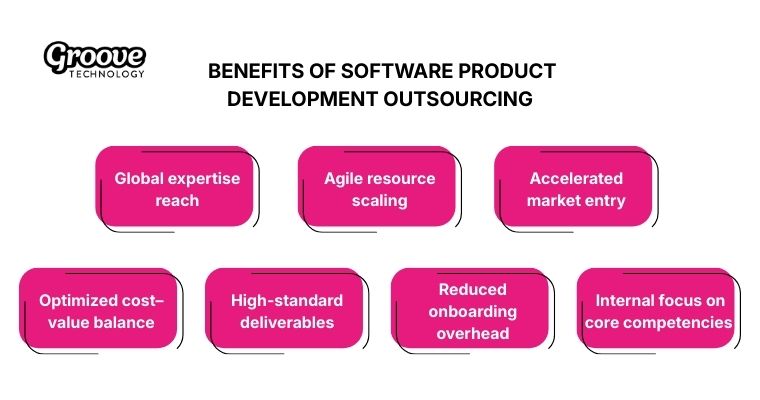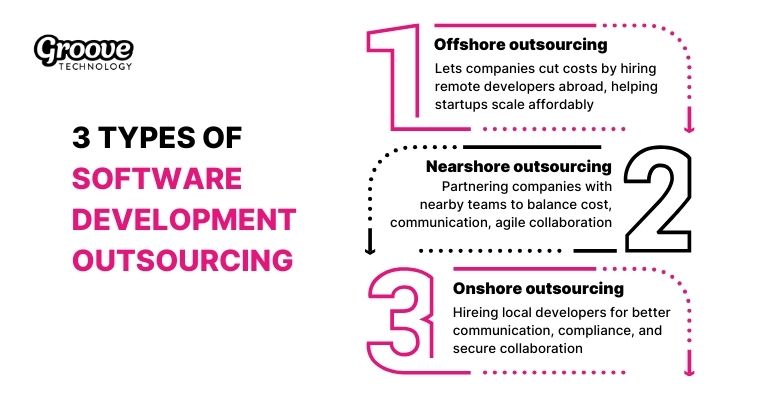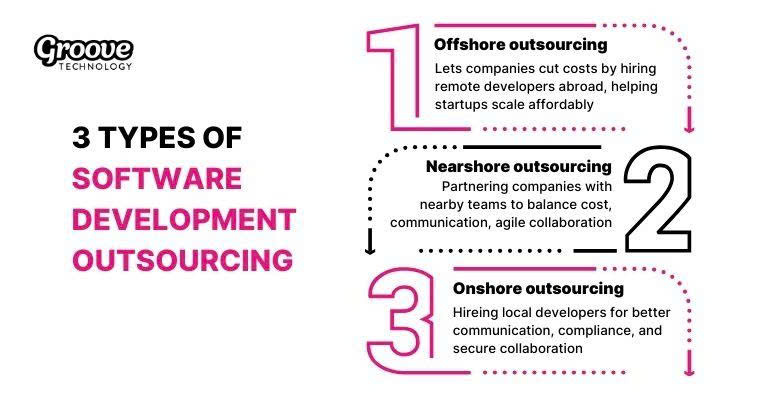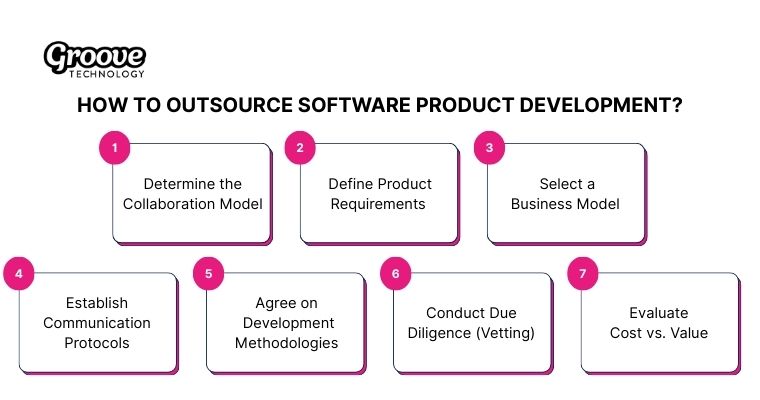What is Software Product Development Outsourcing? How To Outsource?
Software Product Development Outsourcing is a strategic business practice wherein an organization entrusts the lifecycle of a technology product, from initial ideation to long-term maintenance, to an external specialized partner instead of executing it in-house. Unlike traditional task-based outsourcing, this comprehensive approach encompasses the entire product journey, including market strategy, UI/UX design, and technical deployment, allowing businesses to leverage high-level expertise without the operational burden of building an internal team.
Driven by the demand for rapid innovation, the global market for these services reached USD 564.22 billion by 2025, according to Mordor Intelligence. The efficiency of this model is backed by compelling data: Helpware states that businesses can achieve up to 70% in cost savings, while DesignRush reports 37% faster delivery times. Furthermore, the use of hybrid teams has been shown to accelerate Minimum Viable Product (MVP) launches by as much as seven weeks.
Organizations can flexibly choose from frameworks such as dedicated teams, staff augmentation, or project-based models to align with their specific budgets and goals. However, realizing this growth potential requires navigating challenges like communication barriers and security risks through a structured approach and rigorous vendor vetting.
In this guide, Groove Technology provides an in-depth look at what software product development outsourcing entails, exploring both its benefits and challenges while detailing various operational models. We also present a proven 7-step success framework, complete with cost analysis and a comparison between traditional and product outsourcing, to help you discover how the right partnership can transform your development process.

1. What is software product development outsourcing?
Software Product Development Outsourcing is a collaboration model where a company entrusts the end-to-end creation of a technology solution, encompassing ideation, UI/UX design, coding, and long-term maintenance, to an expert external partner. Beyond mere task execution, this approach focuses on building a long-term partnership where the outsourced team functions as a seamless extension of the client’s organization, actively contributing to product strategy and ensuring technical scalability.
With access to global talent through offshore, nearshore, or onshore models, companies can easily scale resources up or down based on project complexity, time zones, or budget requirements. This flexibility makes outsourcing not just a cost-saving tactic, but a growth enabler.
This model serves as a powerful growth enabler rather than just a cost-saving tactic. Global tech giants such as WhatsApp, Google, and Microsoft have long leveraged this strategy to accelerate innovation and tap into specialized global talent pools. For instance, WhatsApp famously outsourced its early development to Eastern Europe to shorten its time-to-market, while Microsoft continues to rely on offshore engineers across Asia to maintain its flagship product ecosystems.
With success stories from these companies, it’s clear that outsourcing has become a proven path to achieving faster innovation, operational efficiency, and competitive advantage in the software industry.

>>> See more: What is a software outsourcing company and how it works?
2. Benefits of software product development outsourcing
Five clear advantages make outsourcing software product development a strong growth driver for businesses seeking to expand more quickly and manage operations more efficiently.
- Global expertise reach: Outsourcing connects companies with skilled professionals across different countries, solving the problem of limited local talent that affects nearly half of U.S. firms. Global collaboration also fosters diverse thinking and brings specialized technical knowledge, thereby strengthening product innovation and overall performance.
- Agile resource scaling: Flexible resource allocation enables businesses to scale their teams up or down based on project size or urgency, eliminating the need for lengthy recruitment processes. Deloitte’s research shows that over 50% of executives face hiring delays, which makes on-demand scalability a key operational advantage.
- Accelerated market entry: Faster product delivery becomes achievable as external teams work across time zones and maintain continuous progress cycles. Internal teams can stay focused on strategic goals while outsourced developers handle implementation and testing, enabling businesses to release products earlier than their competitors.
- Optimized cost–value balance: Outsourcing enables organizations to manage their budgets more effectively without compromising product quality. Around 57% of business leaders cite cost savings as the primary reason for outsourcing, as it enables them to redirect financial resources toward marketing, customer acquisition, or future product updates.
- High-standard deliverables: Experienced outsourcing vendors bring strong technical knowledge, proven development frameworks, and established quality control methods. This expertise directly enhances customer satisfaction and profit margins by delivering reliable software that performs effectively in real-world conditions.
- Reduced onboarding overhead: Unlike hiring in-house staff, outsourcing eliminates the lengthy 3–6 month onboarding cycle. External teams are already experienced, familiar with collaboration frameworks, and can start contributing within days.
- Internal focus on core competencies: Outsourcing reduces the need for businesses to handle HR-intensive tasks, such as training programs, evaluations, and retention activities, freeing internal teams to focus on strategic goals and product innovation.

3. Challenges of outsourcing software product development
There are specific situations where outsourcing software product development becomes not just beneficial, but essential. However, these decisions should always be weighed alongside the challenges of software development outsourcing. Below are some common scenarios that signal it’s time to consider outsourcing.
- Communication Barriers: This is perhaps the most frequent hurdle, particularly in cross-border collaborations. Significant time zone differences can create “decision latency,” while linguistic variations and differing work cultures often lead to critical misunderstandings regarding product requirements.
- For Example: A US-based company outsources to a partner in Southeast Asia. Without established “overlap hours,” a technical question raised in the US afternoon might not get an answer until the next morning, causing a 12-to-24-hour delay for every interaction.
- How to Fix: Establish mandatory synchronization meetings and utilize visual management tools like Jira or Trello to maintain absolute transparency.
- Data Security Vulnerabilities: The sharing of sensitive information increases exposure to potential breaches and intellectual property theft, necessitating robust cybersecurity frameworks and comprehensive confidentiality agreements to protect valuable assets.
- For Example: The tech industry has seen instances where startups had their core product concepts “cloned” by development partners because IP ownership clauses were not strictly defined or enforced from the outset.
- How to Fix: Enforce international security standards (e.g., ISO 27001), sign comprehensive Non-Disclosure Agreements (NDAs), and control access based on the “Principle of Least Privilege.”
- Cost Transparency Issues: Many businesses select partners based on low initial quotes, only to be blindsided by a barrage of extra charges for change requests, project management overhead, or post-deployment support.
- For Example: A vague contract often leads to “budget bleed” caused by technical rework or unforeseen integration costs that weren’t factored into the original scope.
- How to Fix: Prioritize Fixed-Price models for well-defined small projects or Dedicated Team models with transparent, line-item cost breakdowns for larger ventures.
- Resource Dedication Concerns: External developers managing multiple concurrent projects may compromise attention and deliverable quality, potentially affecting project outcomes and organizational reputation through divided focus and competing priorities.
- For Example: A top-tier developer on your project might be reassigned by the vendor to a “whale” client, leaving your product in the hands of less experienced junior staff.
- How to Fix: Secure the right to interview and approve key personnel and include “Team Stability” clauses in the Service Level Agreement (SLA).
- Operational Control Limitations: Relinquishing direct, day-to-day oversight can create anxiety for managers. When a vendor’s internal workflows clash with your corporate culture, quality inconsistencies often remain hidden until they become costly to fix.
- For Example: A lack of clear Key Performance Indicators (KPIs) makes progress assessment vague and subjective, increasing the risk of project drift.
- How to Fix: Implement automated reporting systems and adopt Agile methodologies, allowing you to review tangible progress at the end of every short development Sprint.
5. What are the software product development outsourcing models?
There are three main types of outsourcing that companies can adopt based on their project goals, budget, and management style. Each model defines how the collaboration works, what level of control the client has, and how costs and responsibilities are distributed throughout the project lifecycle.
- Dedicated software development team: Dedicated model involves a group of professionals who work exclusively on a single client’s project. The client manages the workflow, sets priorities, and determines the team composition, while the outsourcing vendor handles recruitment and administration. This model offers flexibility for complex projects, cost efficiency compared to full-time hiring, and continuity, as the same developers remain engaged throughout the product’s development.
- Software development staff augmentation: Staff augmentation allows you to temporarily add skilled external personnel to your in-house team because this strategy helps you fill specific skill gaps immediately. Your internal managers retain full control over daily tasks and project direction while the external resources integrate seamlessly into your existing workflows. You gain high flexibility since you can scale resources up or down based on immediate project demands without the administrative overhead of direct employment.
- Project-based: The project-based model involves handing over the entire development responsibility to the vendor because you want them to manage the project from start to finish based on your specifications. You define the requirements and the final deliverables upfront so the vendor takes ownership of the execution and quality to meet the agreed deadlines. This approach reduces your management burden since the partner focuses on the outcome but you must ensure the scope is clearly defined to avoid misunderstandings.


6. How to outsource software product development?
Outsourcing software product development demands more than just handing over tasks; it requires a strategic, structured approach to guarantee success. By following a clear process, you can minimize risks and maximize the value delivered. Here is a step-by-step guide:
Step 1: Determine the Collaboration Model
Before scouting for a vendor, you must decide how deeply the partner will integrate into your operations, as this choice dictates your level of control.
- In-house team extension: Your internal managers retain control over core roles like project management, while remote developers act as a direct extension of your workforce, focusing solely on coding tasks.
- Short-term contract: Companies typically use this model for projects under 12 months. It is ideal for simple product deployments or feature updates that require vendors with specific, immediate domain expertise.
- Long-term partnership: This approach supports end-to-end, large-scale development. It fosters deep domain expertise and creates a unified vision between your stakeholders and the vendor.
Step 2: Define Product Requirements
A comprehensive roadmap is non-negotiable to ensure the external team understands your specific expectations for the final output. Your plan must clarify whether the scope involves building from scratch or adding features to an existing system so the vendor can prepare accordingly. Furthermore, detailed specifications regarding the target audience and security requirements are crucial; vague instructions often lead to costly strategic misalignment or significant technical debt later on.
Step 3: Select a Business Model
You must select a financial structure that aligns with your goals, as the right engagement model optimizes both your budget and flexibility. Your choice between a dedicated team, staff augmentation, or project-based frameworks depends heavily on your desired level of control, since each option distributes responsibilities differently. Analyze your project requirements carefully to ensure the selected model supports your operational strategy while minimizing financial exposure.
Step 4: Establish Communication Protocols
To prevent information silos, you must define exactly how your internal staff will stay in sync with the external team. Your agreement needs to specify channels, such as instant messaging or project management software, to ensure everyone stays on the same page regarding progress. Additionally, updates should occur daily or weekly based on project needs, because consistent reporting maintains transparency throughout the entire product lifecycle and builds essential trust between both parties.
Step 5: Agree on Development Methodologies
The vendor’s working style must match your needs to facilitate a smooth workflow and rapid adaptation to market feedback. While most companies prefer Agile methodologies for this reason, the vendor should be willing to customize their approach based on your specific timeline and available resources. Regardless of the chosen method, the partner must provide full visibility into the development lifecycle, as hidden processes can quickly create trust issues.
Step 6: Conduct Due Diligence (Vetting)
In this step, you have to verify the vendor’s capability and cultural fit to avoid future roadblocks that could derail the project. Platforms like Clutch or GoodFirms allow you to read unbiased client feedback to validate their claims with real-world performance data. Beyond reputation, you must confirm they possess the specific skill set for your project, because a strong professional connection with the team is often the determining factor in the collaboration’s success.
Step 7: Evaluate Cost vs. Value
Finally, analyze the financial aspect without compromising on quality. The cheapest option often leads to expensive reworks later, which is why business leaders prioritize end-to-end service quality over rock-bottom rates. You must confirm the vendor is upfront about costs to avoid hidden fees in the final invoice. Comparing multiple providers will help you determine who offers the best value for your specific budget, since high rates do not always guarantee superior results.

7. How much does it cost to outsource software product development?
The outsourcing software development cost varies greatly by region, experience level, and project type. On average, outsourcing ranges from $20 to $150 per hour, or approximately $50,000 to $375,000 for a simple application that requires around 2,500 development hours.
| Region | Average Hourly Rate (USD) | Example Cost for Simple App (≈2,500 hours) |
| USA (North America) | $100 – $150/hour | ≈ $250,000 – $375,000 |
| Latin America | $45 – $65/hour | ≈ $112,500 – $162,500 |
| Central & Eastern Europe | $30 – $55/hour | ≈ $75,000 – $137,500 |
| Asia (e.g., India, Vietnam) | $20 – $45/hour | ≈ $50,000 – $112,500 |
Each region offers different cost levels and working advantages, providing companies with flexibility to choose based on their budget, time zone, and communication preferences.
- USA (North America): The United States remains the most expensive destination, with developer rates averaging $100–150 per hour. A simple app that takes around 2,500 hours may cost between $250,000 and $375,000, prompting many American companies, including major tech firms, to outsource overseas for better value.
- Latin America: Countries such as Mexico, Argentina, and Brazil offer a cost-effective nearshore option, with hourly rates ranging from $45 to $65. Companies benefit from overlapping time zones and convenient travel for collaboration, though cultural and language adjustments may be needed in some cases.
- Central & Eastern Europe: This region has become a major outsourcing hub due to its strong STEM education and skilled workforce. Developers usually charge $30–55 per hour, creating a good balance between cost and quality. Popular outsourcing countries include Poland, Ukraine, and Romania, where reliability and communication standards are high.
- Asia (e.g., India, Vietnam): Asia offers the most affordable outsourcing costs, typically ranging from $20 to $45 per hour. The large talent pool allows companies to access developers quickly and scale easily, though outcomes can vary depending on the vendor’s quality standards and management practices.
8. Who should consider outsourcing software product development?
Outsourcing software product development, especially outsourcing software development for startups, suits seven main groups of businesses that need flexibility, speed, or specialized expertise to achieve their goals:
- Startup founders: Early-stage founders rely on outsourcing to build products faster with limited budgets. By working with scalable, fully managed teams, they save time on hiring and coordination while maintaining focus on core business activities that drive growth.
- Small and medium enterprises (SMEs): SMEs aiming for expansion use outsourcing to fill capability gaps without forming a full in-house team. They can choose between staff augmentation for extra support or end-to-end outsourcing for complete product development, depending on their workload and technical maturity.
- Non-technical entrepreneurs: Entrepreneurs without coding or management experience depend on outsourcing partners to develop software ideas into working products. Collaborating with cross-functional teams enables them to achieve long-term scalability while aligning technical execution with business objectives.
- Established companies: Large enterprises facing capacity limits or seeking innovation use outsourcing to access specialized skills. They often combine staffing models with managed services to achieve greater control and creative input, striking a balance between productivity and fresh external perspectives.
- Project managers: Project managers handling complex initiatives benefit from outsourcing when timelines are tight or specific skills are missing internally. By choosing the right outsourcing model, they gain flexibility in managing schedules, team composition, and deliverables.
- Product managers: Product managers driving new launches turn to outsourcing to reduce time to market and maintain efficiency. Collaborating with technical product managers helps synchronize external workflows with the company’s strategic vision and customer expectations.
- IT departments: Internal IT teams facing overload or specialized technical needs outsource to freelance or agency teams. This approach enables them to address urgent challenges, enhance operational efficiency, and manage projects effectively without incurring long-term recruitment costs.

9. Comparing software outsourcing vs software product development outsourcing
Although the terms are often used interchangeably, software outsourcing and software product outsourcing are fundamentally different in scope, goals, and involvement.
- Software outsourcing typically focuses on executing specific technical tasks (mainly coding and development) based on a predefined plan or requirements. In software outsourcing, the outsourced team is usually given a task list and is responsible for delivering code that meets the specifications.
- Software product development outsourcing, on the other hand, covers the entire product lifecycle. This includes ideation, market research, strategy development, implementation, ongoing maintenance, and updates. In product outsourcing, the team is deeply involved from the very beginning. They collaborate on shaping the product vision, defining market fit, and continuously adjusting the roadmap based on user feedback and business goals.
| Aspect | Software Outsourcing | Software Product Development Outsourcing |
| Scope | Limited to designated phases, including coding, testing, and maintenance | Encompasses full product lifecycle: strategy, design, development, quality assurance, deployment, support |
| Client Responsibility | Managing requirements, project direction, and system integration | Minimal oversight with external teams managing processes, quality, and product direction |
| Vendor Responsibility | Executing assigned tasks according to client specifications | Delivering market-ready products with innovation and roadmap accountability |
| Project Type | Well-defined, short-term, or modular initiatives | Long-term, strategic, innovation-driven product development |
| Management Approach | Requires hands-on client oversight and coordination | Vendor-managed project coordination and quality control |
| Expertise Access | Specific technical skills and resource augmentation | Multidisciplinary teams spanning strategy, UX/UI, development, QA, and DevOps |
| Best Applications | Companies with clear specifications needing skill gaps filled or rapid scaling | Businesses lacking technical expertise seeking new product development or innovation |
Conclusion
This comprehensive guide examines the fundamentals of outsourced software product development, covering strategic implementation timing, competitive advantages, potential drawbacks, and practical execution frameworks. Readers gained insight into distinguishing between traditional outsourcing and comprehensive product development partnerships, while also understanding vendor evaluation methodologies and best practices for collaboration.
Groove Technology provides specialized software product development outsourcing services designed to transform business concepts into market-ready solutions through transparent processes and expert collaboration. Our dedicated teams handle complete product lifecycles while allowing clients to focus on core business strategies and market expansion initiatives.
Related Articles:
- Why Outsource Software Development: 7 Key Benefits
- Best Practices for Hiring Outsourcing Software Developer Teams
- How to Outsource Software Development Projects Successfully





